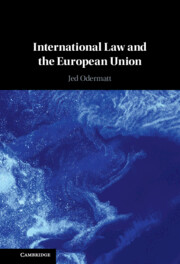21 results
The Court of Justice of the European Union and International Dispute Settlement: Conflict, Cooperation and Coexistence
-
- Journal:
- Cambridge Yearbook of European Legal Studies / Volume 24 / December 2022
- Published online by Cambridge University Press:
- 20 January 2023, pp. 88-110
- Print publication:
- December 2022
-
- Article
-
- You have access
- Open access
- HTML
- Export citation
3 - The European Union’s Role in the Making and Confirmation of Customary International Law
- from Part I - A View from the Outside
-
-
- Book:
- The European Union and Customary International Law
- Published online:
- 27 October 2022
- Print publication:
- 03 November 2022, pp 66-94
-
- Chapter
- Export citation
Tables
-
- Book:
- International Law and the European Union
- Published online:
- 08 October 2021
- Print publication:
- 21 October 2021, pp viii-viii
-
- Chapter
- Export citation
3 - The Law of Treaties
-
- Book:
- International Law and the European Union
- Published online:
- 08 October 2021
- Print publication:
- 21 October 2021, pp 59-130
-
- Chapter
- Export citation
5 - International Dispute Settlement
-
- Book:
- International Law and the European Union
- Published online:
- 08 October 2021
- Print publication:
- 21 October 2021, pp 169-195
-
- Chapter
- Export citation
7 - Concluding Remarks
-
- Book:
- International Law and the European Union
- Published online:
- 08 October 2021
- Print publication:
- 21 October 2021, pp 246-253
-
- Chapter
- Export citation
Introduction
-
- Book:
- International Law and the European Union
- Published online:
- 08 October 2021
- Print publication:
- 21 October 2021, pp 1-8
-
- Chapter
- Export citation
Index
-
- Book:
- International Law and the European Union
- Published online:
- 08 October 2021
- Print publication:
- 21 October 2021, pp 254-264
-
- Chapter
- Export citation
1 - The European Union in International Law
-
- Book:
- International Law and the European Union
- Published online:
- 08 October 2021
- Print publication:
- 21 October 2021, pp 9-32
-
- Chapter
- Export citation
2 - Customary International Law
-
- Book:
- International Law and the European Union
- Published online:
- 08 October 2021
- Print publication:
- 21 October 2021, pp 33-58
-
- Chapter
- Export citation
4 - International Organizations
-
- Book:
- International Law and the European Union
- Published online:
- 08 October 2021
- Print publication:
- 21 October 2021, pp 131-168
-
- Chapter
- Export citation
6 - International Responsibility
-
- Book:
- International Law and the European Union
- Published online:
- 08 October 2021
- Print publication:
- 21 October 2021, pp 196-245
-
- Chapter
- Export citation
Copyright page
-
- Book:
- International Law and the European Union
- Published online:
- 08 October 2021
- Print publication:
- 21 October 2021, pp iv-iv
-
- Chapter
- Export citation
Contents
-
- Book:
- International Law and the European Union
- Published online:
- 08 October 2021
- Print publication:
- 21 October 2021, pp vii-vii
-
- Chapter
- Export citation
Dedication
-
- Book:
- International Law and the European Union
- Published online:
- 08 October 2021
- Print publication:
- 21 October 2021, pp v-vi
-
- Chapter
- Export citation

International Law and the European Union
-
- Published online:
- 08 October 2021
- Print publication:
- 21 October 2021
Fishing in Troubled Waters: ECJ 27 February 2018, Case C-266/16, R (on the application of Western Sahara Campaign UK) v Commissioners for Her Majesty’s Revenue and Customs, Secretary of State for Environment, Food and Rural Affairs
-
- Journal:
- European Constitutional Law Review / Volume 14 / Issue 4 / December 2018
- Published online by Cambridge University Press:
- 16 November 2018, pp. 751-766
- Print publication:
- December 2018
-
- Article
- Export citation
Patterns of avoidance: political questions before international courts
-
- Journal:
- International Journal of Law in Context / Volume 14 / Issue 2 / June 2018
- Published online by Cambridge University Press:
- 29 May 2018, pp. 221-236
-
- Article
- Export citation
Council of the European Union v. Front Populaire pour la Libération de la Saguia-El-Hamra et Du Rio de Oro (Front Polisario)
-
- Journal:
- American Journal of International Law / Volume 111 / Issue 3 / July 2017
- Published online by Cambridge University Press:
- 29 November 2017, pp. 731-738
- Print publication:
- July 2017
-
- Article
- Export citation
THE DEVELOPMENT OF CUSTOMARY INTERNATIONAL LAW BY INTERNATIONAL ORGANIZATIONS
-
- Journal:
- International & Comparative Law Quarterly / Volume 66 / Issue 2 / April 2017
- Published online by Cambridge University Press:
- 14 March 2017, pp. 491-511
- Print publication:
- April 2017
-
- Article
- Export citation



